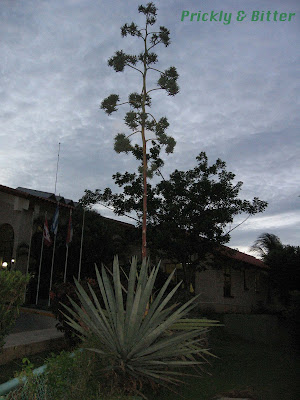Tuesday, June 5, 2012
The other tequila: Mezcal
Species name: Agave angustifolia
Common name: Caribbean agave, Century Plant
Location: Cuba
This species of Agave is native to southern Mexico and Central America. It is a popular ornamental plant in North America (depending on richness of soil, it can even survive in Canada), with enormous flowers that quite literally pop up overnight. One of the common names of this plant, the century plant, refers to seemingly how often it flowers in nature: it is native to a very dry, very hot environment where plant reproduction is often delayed in favour of general survival. Many of the species of this genus have adaptations similar to those of the Aloe plant; they have large, fleshy leaves that they use to store water, using this stored water for basic survival during drought. During times of rain, the plant absorbs as much water as it can and sends up a flower stalk at night (when it's cooler) to reproduce. Pollination can occur with the help of insects or wind, or it can self-pollinate. The seeds then develop with the help of this stored water, and the seeds are ready for dispersal by the morning. If you think about how long it takes that oak tree in your front yard to make acorns, this is an incredibly quick process! So quick, in fact, that it makes me wonder how this plant doesn't make mistakes with seed assembly and tissue maturation. I guess that's why the plant is the Agave and I'm not!
This species of Agave is sometimes popular (more common is Agave americana) in Mexico to make the drink mezcal (or mescal, despite having nothing to do with the drug mescaline...which they are also known for). The leaves of mature Agave plants are fermented into a mash, then the mash is distilled and clarified. Contrary to popular belief, this is not tequila (made from a different species of Agave, but made from the flowers and the flower stalks and not the leaves). Most people who try "maguey tequila" try it from a bottle that contains a worm, which is probably as gross as it sounds, and are sorely disappointed that this isn't the world-famous tasty tequila they've been hearing about since they started planning their trip to Mexico. I've also heard it's a fun game for Mexican people to get tourists to drink "the good stuff" and give them a bottle of mezcal that they've paid way too much for. This is why it's useful to know botany: not all liquors from plants of the same group are created equal!
Subscribe to:
Post Comments (Atom)


No comments:
Post a Comment